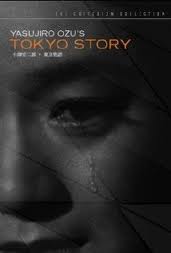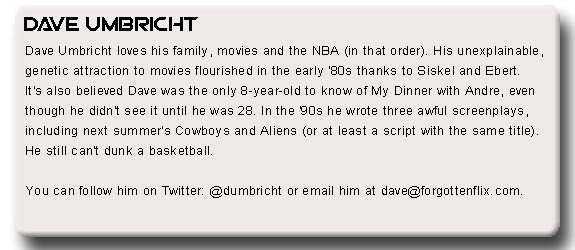My double-shot of Ozu in one week was well worth the time.
I watched Tokyo Story (1953) last week, and as you know, we screened Late Spring (1949) as part of our TPR Cinema Tuesdays series. If I had to immediately pick one above the other, I think I’d say I like Tokyo Story more.
We often hear of how well Eastern cultures treat their elders, so it was with some curiosity that I watched Tokyo Story, about an older couple that makes the long journey to the nation’s capital, only to be shuffled about by their children, too busy in their own lives to be burdened with entertaining and caring for the couple.
Although Ozu is often called one of Japan’s “most Japanese” filmmakers, I found the theme to be decidedly modern and Western. And after watching Late Spring, I found it interesting that Ozu cast Setsuko Hara as the daughter-in-law – not even blood relation – that does go out of her way to entertain the elderly couple. In both films, she radiates purity and goodness.
I looked up the movie on Wikipedia to read a little more, and found that scholar David Bordwell describes its pacing not as slow, but “calm.” That’s an apt term to use. Watching this movie placed me in a reflective, relaxed state.
But as I await your first response, I think I’ll call my mom and dad to say hello.
Dave
I hope your parents are doing well. I think I will struggle to do justice to this movie in words. I have read enough about the style of Ozu to regurgitate little bits of trivia about his use of transition shots (described as “pillow shots”) to set a mood from scene to scene or how he only shot from floor level to simulate the height of someone kneeling on a mat. But, that deconstruction doesn’t do justice to the film. It is a movie of mood and pace, and yes, meditation.
But I wasn’t ready for it the first time I tried to watch. I had seen this on many lists as one of the greatest films of all time (#5 on BFI Sight & Sound critic’s list), and expected something rousing. I don’t particularly know why, but I must have felt that a great movie must incite something emotional in me. I guess I believed emotional response meant something that elicited awe or adrenaline. Maybe it’s because my main exposure to Japanese films was to Kurosawa (as completely opposite in tone as any style could be). Anyways, I was wrong. And I turned it off within the first ten minutes, for no other reason than it wasn’t what I expected.
When I finally returned to it? It never quite hit me. Never quite had the emotional response that I read others having – one critic, I can’t remember who, said that he cried every time he reached the end. I felt like the callous jerk that doesn’t have an emotional response like others at a funeral.
So why did I recommend this? After much soul searching (and two more Ozu movies) I finally got into the gentle rhythm of his style, and I loved Late Spring. His movies are truly spiritual experiences, filmed meditation. I just wasn’t completely ready for my first experience. Ever have that happen to you with a movie?
Nathan
Oh yes, there have been movies that I’ve enjoyed more upon a second or third viewing. The Producers and Blazing Saddles were both like that. I recognized them both as funny movies the first time, but after a second viewing, I really, really laughed a lot more, and recognized the genius and audacity of Mel Brooks. Chinatown was another movie that I saw at home for the first time back in 1998. “I can see why it made the AFI list,” I thought to myself at the time, but I just didn’t fully get it. Then I saw it on the big screen, and it was so much more powerful. Polanski uses every inch of the frame in that movie.
But both of those are two entirely different films from Tokyo Story. It’s safe to say I really enjoyed this film, my first experience with Ozu. It’s more than just the pillow/establishing shots that help set the mood. The dialogue, and the very way in which it is delivered, especially by Chieko Higashiyama (the elderly mother) and Chishu Ryu (the elderly father) also create a sense of calm and peace. I’d like to watch the movie again to hear more of what they say.
Ryu is especially good in both this film and Late Spring. In Tokyo Story, he recognizes the differences between his generation and that of his children, and the distance that naturally grows between them. In Late Spring, neither he, a widow, nor his daughter want to part from the comfortable relationship they’ve grown into, she acting as his caretaker. But he tells a lie about remarrying — and does she know it? — to give her the gentle push she needs to leave him, and be married herself, before she grows too old. It’s kind of heartbreaking when you think about it.
It’s worth noting that in Tokyo Story, Ryu plays a character several years older than he was at the time. Ryu has this amazing presence about him; I don’t think he’s ever angry at his children for essentially abandoning him and his wife on their visit. And resignation is too strong a word to use, too. He just recognizes it as a fact. Maybe that’s what some critics find so sad about the film.
Dave
I had the same reaction to Chinatown. In the mid 90’s I was trying to write the Great American Screenplay, and just as many say Gatsby is the Great American Novel, people point to Chinatown as the G.A.S. and Robert Towne the best American screenwriter (I prefer William Goldman). It just didn’t work for me. There may be a number of reasons, but on teacher I had pointed out the second act, when Towne seems to get a bit lost in his writing. Any ways, today I recognize it as a great work.
In my limited experience with Ozu (Tokyo Story, Late Spring, and Floating Weeds), I’d say you sum up the spiritual magic of his work perfectly. It has me wanting to hit the video store tonight and delve deeper into his work. So how did we go from Godzilla to this? I originally thought that the professor in Godzilla was Chishu Ryu, but he was actually Takashi Shimura, who stars in a number of Kurosawa films (including as the leader of The Seven Samurai). However, since you had already seen many of Kurosawa’s films, I thought of Ozu (be happy I didn’t go with Miike and Audition).
One final note from me, there is an American film called Make Way for Tomorrow (1937) that predates this, dealing with the same exact plot (I believe Tokyo Story is a remake). Oh, and my parents are visiting tonight, I’ll make sure I’m extra nice to them.
Nathan
Oh, and here I thought Tokyo itself was the connection between the two!
Dave
So what’s your next pick?
Nathan
Have you seen Shane?
Dave
Yes – but you have to tell me how it links to Tokyo Story.
Nathan
Same year. Also a movie I watched once, liked it okay… But then saw it again last year on the big screen, and really, really liked it.
Of all those Kurosawa I mentioned—have you seen Dreams?
Dave
I have not seen Dreams – so we shall stay in Japan for a bit longer.
So join Nathan and Dave in a couple of weeks for a discussion of dreams vs. reality, through the eyes of one of the Masters.


